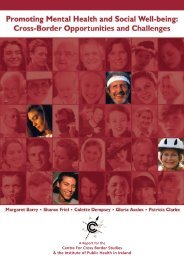improving government service delivery to minority ethnic ... - NCCRI
improving government service delivery to minority ethnic ... - NCCRI
improving government service delivery to minority ethnic ... - NCCRI
You also want an ePaper? Increase the reach of your titles
YUMPU automatically turns print PDFs into web optimized ePapers that Google loves.
<strong>improving</strong><br />
<strong>government</strong><br />
<strong>service</strong><br />
<strong>delivery</strong><br />
<strong>to</strong> <strong>minority</strong><br />
<strong>ethnic</strong> groups<br />
Chapter 3: Scotland Research Findings 80_81<br />
140_www.onescotland.com<br />
141_Barclay, A., A.<br />
Bowes, I. Ferguson et al<br />
(2003) Asylum Seekers<br />
in Scotland, Scottish<br />
Executive.<br />
142_UHI Policyweb and<br />
the National Centre for<br />
Migration Studies (2005),<br />
Migrant Workers in the<br />
Highlands and Islands:<br />
Highlands and Islands<br />
Enterprise.<br />
Figure 6: Minority Ethnic Population in Scotland<br />
More recent arrivals in Scotland have been the asylum seeker and refugee population. Since the introduction<br />
of the UK 1999 Asylum and Immigration Act, it is estimated that 9,000 asylum seekers have been dispersed <strong>to</strong><br />
Glasgow. Studies have shown that asylum seekers in the UK are the most likely of the non-white population <strong>to</strong><br />
encounter hostility. A poll in June 2002 found that 24% of Scots thought that it was justifiable <strong>to</strong> verbally attack<br />
asylum seekers who receive housing and benefits in Scotland. 140<br />
Research carried out in behalf of the Scottish Executive in 2003 141 found that:<br />
“ Service providers emphasised the ‘steep learning curve’ experienced in their work with<br />
dispersed asylum seekers. For some, expertise and resources were initially stretched<br />
<strong>to</strong> the limit, though over time provision was believed <strong>to</strong> have improved. Multi-agency<br />
working was identified as an area of strength.”<br />
More recently Scotland has seen the arrival of migrant workers from Eastern Europe. The Department of<br />
Work and Pensions record National Insurance Number (NINo) applications from overseas nationals including<br />
nationals from EU accession states. Between May 2004 and April 2005 there were 23,885 registrations of<br />
overseas nationals in Scotland and 67% of these were from EU accession states. 142
















